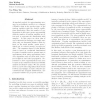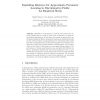190 search results - page 10 / 38 » Markov Random Fields with Efficient Approximations |
ICML
2004
IEEE
14 years 8 months ago
2004
IEEE
A standard method for approximating averages in probabilistic models is to construct a Markov chain in the product space of the random variables with the desired equilibrium distr...
EMMCVPR
2005
Springer
2005
Springer
Exploiting Inference for Approximate Parameter Learning in Discriminative Fields: An Empirical Study
14 years 1 months ago
Abstract. Estimation of parameters of random field models from labeled training data is crucial for their good performance in many image analysis applications. In this paper, we p...
JAIR
2006
13 years 7 months ago
2006
Loopy and generalized belief propagation are popular algorithms for approximate inference in Markov random fields and Bayesian networks. Fixed points of these algorithms have been...
CVPR
2009
IEEE
15 years 2 months ago
2009
IEEE
Many problems in computer vision can be modeled using
conditional Markov random fields (CRF). Since finding
the maximum a posteriori (MAP) solution in such models
is NP-hard, mu...
CVPR
2009
IEEE
15 years 3 months ago
2009
IEEE
Belief propagation (BP) is an effective algorithm for solving energy minimization problems in computer vision. However, it requires enormous memory, bandwidth, and computation beca...



